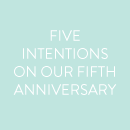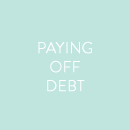2 April 2013
Today is the day! The day I’m going to walk you through exactly how John and I track our budget. By the end, you might think I’m a genius, or you might think I’m absolutely insane. Maybe we’ll take a poll :) The reason I say that is because it is not the simplest system (at least on the surface), but it works very well for us. And that’s the point — if there’s one thing I’d like for you to take away from these posts, it’s to find a tracking system that works for you, and stick to it. It might take several tries to find a system that is aligned with your strengths and guards against your weaknesses, but once you find it, you’ll be golden. Seriously, if you can stick to a budget, I truly believe your life possibilities will expand rapidly in front of you. Alright, on with it. Our system was custom designed by John on Google Docs. (To give credit where credit is due, it was inspired by a budget Jenna’s husband designed.) Let’s start by laying out a few pros and cons of our system: Good for someone who: — is incentivized by saving — is a more natural saver than spender / likes to know exactly where her money is going — likes to look at spending data over time Bad for someone who: — does not have an interest in record keeping — is prone to overspending There are a LOT of moving parts to our budgeting system, but I’ll walk you through them. John has put together a dummy copy of our budget for you all to use if you’d like, and it will probably help to open that doc in another tab so you can reference it while you
30 January 2013
I have followed a written budget for seven years now, and I can confidently say that it is the number one reason I feel at peace with my finances. I don’t worry about whether or not we’ll have enough money to pay our rent or car loans every month; I know we will. The headspace this surety frees up allows me to focus on my dreams and keeps me on track to reach my lifetime financial goals. There are few things better than that! I know you all are excited to talk budgeting, so let’s get cracking. So what does it mean, exactly, to build a budget? Dave Ramsey likes to say that budgeting is “telling your money where to go.” I like that image. A budget helps me be purposeful about how I spend and save instead of just closing my eyes and hoping. While there are many ways to track a budget (some of which we’ll be covering in the next few weeks!), building a budget is pretty standard. It’s all about two things — income and expenses — which make up your cash flow. 1. Calculate your monthly net income (your gross income minus taxes). For most of us, this is simply our paycheck. 2. Add up all of your fixed expenses. Fixed expenses are difficult or impossible to change and are the same (or roughly the same) every month: rent, utilities, your electric bill, student loans, car loan(s), auto insurance, health insurance, etc. 3. Calculate your monthly contribution to your financial goals. Like the experts say, pay yourself first. Put money into an emergency fund, reduce debt with extra payments, save for a down payment, save for retirement, and/or feed an investment account. If it’s a priority for you, include charitable giving in this step. Some
11 January 2013
Hello, friends! Happy Tuesday! A long time ago, I asked if you all would be interested in an occasional money series on Em for Marvelous. Turns out you were interested (as was I), but nothing ever happened. And that’s pretty sad to me, because I LOVE talking about all aspects of money management, and financial literacy, especially amongst young people, is a huge passion of mine and John’s. So, better late than never, right? I thought we’d try a once-a-week series for the length of January (since so many people put financial goals on their New Year’s lists!), then slim down to maybe a once a month post until I run out of things to say or y’all get bored. I have lots of ideas for future posts, but please let me know in the comments if there’s something in particular you’d like me to cover! To begin, I thought I’d tell you a little bit about our money story, so you can see where I’m coming from and decide for yourself whether or not you’d like to take my advice :) I think there’s a lot of power in taking a hard look at your money past, and really thinking about your ideal money future, so I’d encourage you to do the same after you read this! Here goes! I can remember writing out an allowance savings plan for Breyer horses when I was in fourth grade. I started saving for my wedding my freshman year of college. (Don’t worry, I didn’t tell anyone.) I opened an IRA the following year. Though I was and always have been a saver and a planner, I didn’t become passionate about personal finance until John did. Lover of ponies and planning from a young age (I’m on the right) Like me, he



















